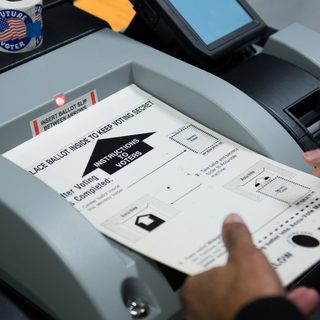July 26, 20194 min read, 789 words
Published: July 26, 2019 | 4 min read, 789 words
The headlines sound pretty bad. "," says The New York Times. "New Senate Intelligence report shows 'extensive' Russia 2016 election interference," Vox.What these and many other fearmongering headlines leave out is that while Russians may have targeted state elections systems in 2...
CRITIC REVIEWS
There don't seem to be any reviews yet.
PUBLIC REVIEWS
Great Context
July 26, 2019
This piece succinctly provides the full context that so many other publications are sensationalizing. Author Elizabeth Nolan Brown does well to remain objective and to dive a layer deep than most other reporting on the Russian election interference story. I wouldn't add or take away anything from this piece, it's perfect.
July 26, 2019
Investigative
July 26, 2019
Article summarizes senate report succinctly with very little opinion injected.
July 26, 2019
Speculation
July 27, 2019
The article points out (correctly) that Russia was unable to directly alter election results in 2016; however, the conclusion cannot be drawn that there is no cause for concern. Just the fact that they attempted to compromise voting machines is enough to give this issue serious attention.
This is a right-leaning website, but they do not appear to be overly pro-Trump.
July 27, 2019
Hit Piece
July 27, 2019
I'm going to basically do what this article did to the articles it is addressing:
The headline "Media Overhypes Russian Hacking, Again" understates the fact that the senate concluded that in all likely hood Russia did try to get access to voting data over the past 3 years.
Now that comment undercuts what the rest of the article said, which is basically the exact same thing that the other two articles it is attacking said, Russia tried and probably failed to get access to voting booths/ data in many elections across the country before and after the election. This article even conveniently cuts off the subheadline from the Vox headline "New Senate Intelligence report shows “extensive” Russia 2016 election interference
It also notes that Russia targeted voting systems in all 50 states".
Anyway, the majority of the content seems correct (and almost exactly like what previous headlines have reported), I just think it's just as bad to have a headline that's slamming an article that you go and basically summarize in your own article as it is to have a headline that overstates what one particular senate report says so people click.
July 27, 2019
Investigative
July 27, 2019
While I thought this article could've done more to show other news outlets that are sensationalizing the information, this author digs into the full report (linked) to criticize how Vox and NYT present the same information.
I would've given this full stars if the author was able to put page numbers to the quotes that were pulled from the report. That way I could quickly find that information and read what's around it, too.
July 27, 2019
Great Context
July 26, 2019
This is the proper take on all this. Sure it happened, but it's not new, they're not the only ones, and we have been influencing elections around the world for decades.
July 26, 2019
Balanced
August 1, 2019
Whilst the claim of Russian interference in the 2016 election is generally uncontested & this article points out that no actual votes were altered, I would have expected that the article refer to the Intelligence Community assessment paper, falsely stated to represent the findings of 17 IC agencies. That shoddy document produced by only 3 agencies (CIA, NSA & DNI) was accompanied by warranties, 2 of which were rated probable & one rated possible (NSA) re “Russian hacking of the election” (meaning the DNC email theft). The conflating of “Russian Hacking of the DNC” & Russian efforts to manipulate votes has greatly contributed to widespread belief in this narrative despite the absence of verified evidence. Of major concern, worthy of mention, is the failure of any investigative agency to secure access to the DNC server. The decision to allow the Clinton linked cyber-security company CrowdStrike to analyse the DNC server, was deeply flawed and highly suspect and their conclusion regarding Russian responsibility for the theft of the Podesta emails, has been strongly refuted by former NSA technical development head, William Binney, whose cyber-security investigators (The VIP Group) found that the emails were downloaded onto a USB stick or hard drive and walked out of the building. At the end of the day, it still appears that insufficient information has been released to the public regarding the veracity of claims regarding Russian interference with the 2016 election and we should be demanding far more evidence that such interference actually occurred.
August 1, 2019
